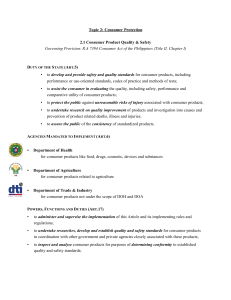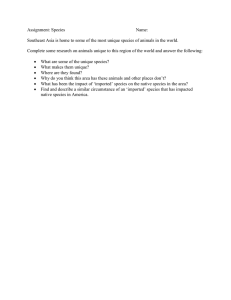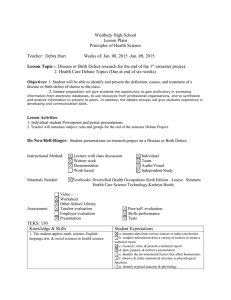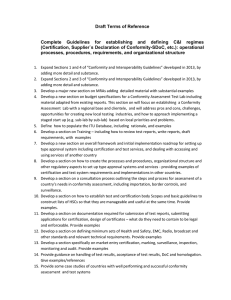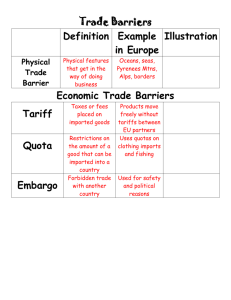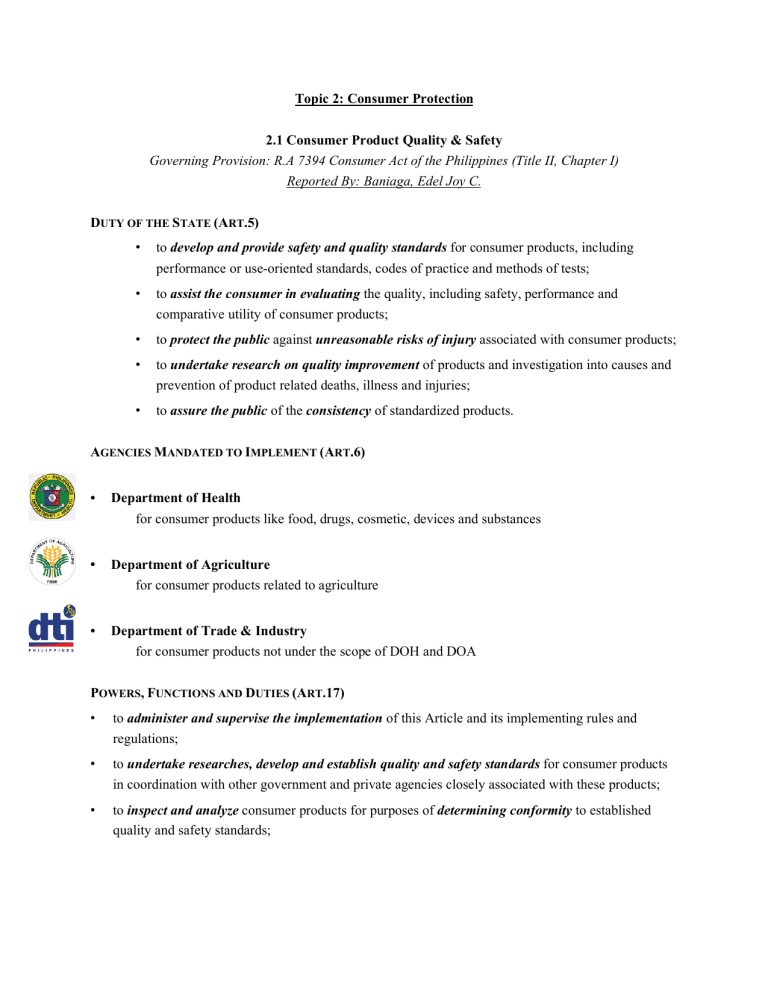
Topic 2: Consumer Protection 2.1 Consumer Product Quality & Safety Governing Provision: R.A 7394 Consumer Act of the Philippines (Title II, Chapter I) Reported By: Baniaga, Edel Joy C. DUTY OF THE STATE (ART.5) • to develop and provide safety and quality standards for consumer products, including performance or use-oriented standards, codes of practice and methods of tests; • to assist the consumer in evaluating the quality, including safety, performance and comparative utility of consumer products; • to protect the public against unreasonable risks of injury associated with consumer products; • to undertake research on quality improvement of products and investigation into causes and prevention of product related deaths, illness and injuries; • to assure the public of the consistency of standardized products. AGENCIES MANDATED TO IMPLEMENT (ART.6) • Department of Health for consumer products like food, drugs, cosmetic, devices and substances • Department of Agriculture for consumer products related to agriculture • Department of Trade & Industry for consumer products not under the scope of DOH and DOA POWERS, FUNCTIONS AND DUTIES (ART.17) • to administer and supervise the implementation of this Article and its implementing rules and regulations; • to undertake researches, develop and establish quality and safety standards for consumer products in coordination with other government and private agencies closely associated with these products; • to inspect and analyze consumer products for purposes of determining conformity to established quality and safety standards; • to levy, assess, collect and retain fees as are necessary to cover the cost of inspection, certification, analysis and tests of samples of consumer products and materials submitted in compliance with the provisions of this Article; • to investigate the causes of and maintain a record of product-related deaths, illnesses and injuries for use in researches or studies on the prevention of such product-related deaths, illnesses and injuries. • to accredit independent, competent non-government bodies, to assist in (1) monitoring the market for the presence of hazardous or non-certified products and other forms of violations of Article 18; and (2) other appropriate means to expand the monitoring and enforcement outreach of the department in relation to its manpower, testing and certification resources at a given time. • to accredit independent competent testing laboratories. INCLUSIONS REQUIRED IN CONSUMER PRODUCT QUALITY AND SAFETY STANDARDS (ART.7) • requirements as to performance, composition, contents, design, construction, finish, packaging of a consumer product; • requirements as to kind, class, grade, dimensions, weights, material; • requirements as to the methods of sampling, tests and codes used to check the quality of the product; • requirements as to precautions in storage, transporting and packaging; • requirements that a consumer product be marked with or accompanied by clear and adequate safety warnings or instructions, or requirements respecting the form of warnings or instructions. PUBLICATION AND EFFECTIVITY OF CONSUMER PRODUCT STANDARD (ART. 8-9) Publication • The concerned department shall publish or cause the publication of the same in TWO (2) newspapers of general circulation at least once a week for a period of not less than one (1) month • May conduct an information campaign through other means deemed effective Effectivity • The standard or the rule shall specify the date such rule is to take effect, which shall not exceed ninety (90) days from the date promulgated • Unless: the concerned department finds (for a good cause) that a later effective date is in the public interest and publishes its reasons for such findings The department may prohibit a manufacturer from “ stockpiling” consumer products to prevent such manufacturer from circumventing the purposes of this paragraph. INJURIOUS, DANGEROUS OR UNSAFE PRODUCTS (ART. 10-11) If the product upon investigation or through customer complaint found a product that is injurious, dangerous or unsafe: • the department can have it recalled and prohibited from public sale or distribution • it will remain prohibited until it is ensured that it is safe to use again If the department determined a consumer product to be substandard or materially defective, the manufacturer/business owner should: • give notice to the public of the defect or failure to comply with the product safety standards; and • give notice to each distributor or retailer of such product. If a customer was injured by the product: • refund the purchase price of the product less a reasonable allowance for use • pay the consumer reasonable damages as may be determined by the department • bring such product into conformity with the requirements or to repair the defect • replace the product with a like or equivalent product which complies with the applicable consumer product standards which does not contain the defect; CERTIFICATION OF CONFORMITY TO CONSUMER PRODUCT STANDARDS (ART.14) • Before a product is allowed to be sold in the market it must pass the quality and/or safety standard • It should also have the Philippine Standard Certification Mark IMPORTED PRODUCTS (ART. 15) Any consumer product offered for importation shall be refused admission if such product: • Fails to comply with an applicable consumer product quality and safety standard or rule • Determined to be injurious, unsafe and dangerous • Low quality / Substandard • Has material defect IMPORTANT NOTES FOR IMPORTED PRODUCTS • Samples of the products that does not comply with such conditions may be obtained to allow the owner or consignee to prove that they comply with the standards • Concerned department may defer final determination as to the admission of such product that can be subjected to modification for a period not exceeding ten (10) days • Imported consumer products not admitted must be exported or Commissioner of Customs may permit the destruction of the product CONSUMER PRODUCTS FOR EXPORTS (ART.16) Article 15 does not apply to any consumer products if: • it can be shown that such product is manufactured, sold or held for sale for export from the Philippines, or that such product was imported for export • such consumer product or the packaging thereof bears a stamp or label stating that such consumer product is intended for export and actually exported. PROHIBITED ACTS (ART.18) PENALTIES (ART.19) Resources: https://www.officialgazette.gov.ph/1992/04/13/republic-act-no-7394-s-1992/ https://youtu.be/6pkZhgCEKNQ
